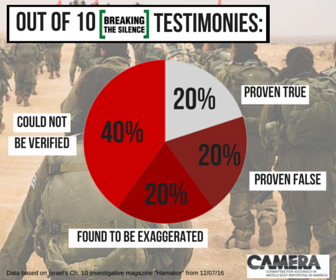Once described as the “most hated group” in Israel, few NGOs evoke the same level of raw emotion as “Breaking the Silence” (BtS). The European-funded Israeli organization publishes testimony, in Hebrew and in English, of Israeli soldiers with the stated aim to “expose the Israeli public to the reality of everyday life in the Occupied Territories.”
Although leading international media outlets have in the past cited and relied upon the organization’s material, at the core of the controversy surrounding this group is the question of whether the published testimonies are reliable. A July 12 investigative report by “Hamakor,” Israel’s Channel 10’s flagship news magazine, suggests that the answer is a resounding “No.”
BtS: Highest Professional Standards?
Since a group of Israeli soldiers who served in Hebron launched the organization in 2004, BtS has published dozens of soldiers’ testimonies documenting “everyday life in the Occupied Territories” in order to “demonstrate the depth of corruption which is spreading in the Israeli military.” Defending themselves from critics’ accusations that they are merely peddling in gossip and unconfirmed reports, BtS argues “its personal testimonies have all been crosschecked, verified and passed through Israeli military censorship before publication.”
Some defenders of the organization have claimed that so far not one serious error has been found in their published testimonies.
“Hamakor” Investigative Report

Testimony by BtS Staff – Some False, Some True, Some Exaggerated
“Hamakor” first checked the testimonies of BtS staff. The program examined three testimonies by Avner Gvaryahu, a founder and prominent representative of the organization.
The first of Gvaryahu’s testimonies involved a soldier in his unit who was allegedly upset that he missed his shot at an unarmed Palestinian (starting at 42:30). The soldier in question, however, told a very different story. By his account, the “unarmed” Palestinian had thrown two grenades at the unit, one of which narrowly missed the soldiers.
In his second (44:00) testimony, Gvaryahu claimed that his unit regularly beat arrested Palestinians. The same soldier involved in the first claim confirmed that there were some “light” beatings, but said this was very much the exception rather than the rule.The “Hamakor” journalists conclude that Gvaryahu’s story is an exaggeration.
Gvaryahu’s third and final testimony involved allegedly permissive and inappropriate rules for the use of live fire in residential areas. Fellow soldiers serving for Gvaryahu’s unit confirmed his claim that they were permitted to fire at anyone who emerged from a narrow passage (after they were shot upon from the same area). In short, “Hamakor” determined that one of Gvaryahu’s accounts was false, another was exaggerated and the third was true.
Nadav Weiman, a second BtS staff member, testified that soldiers were mapping Palestinian homes just to harass them. Weiman’s commander flatly denied the claim regarding harassment and maintained that the mapping was necessary for intelligence purposes. Goren and Rom concluded that Weiman’s testimony illustrates one of the common criticisms against the group – that the soldiers themselves often have a very limited understanding of the events around them.
The Libel of Jewish Rabbis Poisoning Wells
A few weeks ago, while addressing the European Parliament, President Mahmoud Abbas of the Palestinian Authority accused Israeli rabbis of calling on their government to poison Palestinian wells. This claim was easily debunked (with CAMERA’s aid), and Abbas was compelled to retract his claims.
The source for Abbas’s wild claim was a video published on the Israeli news site NRG showing Yehuda Shaul – a BtS founder – on a speaking tour in the South Hebron Hills. He claimed that settlers had poisoned a nearby well.It emerged that this claim likewise lacked credibility. “Hamakor”’s investigation of the 2004 well incident (starting at 47:00) found that there were no eyewitnesses who saw a settler poison the well. The evidence amounted to a Palestinian who spotted settlers near the well before a dead chicken was found inside it.
Despite the dubious evidence, “Hamakor” noted that Yehuda Shaul continued to tell the story in his various Hebron tours.
How Vigorous is the Vetting Process?
In the first anonymous testimony, a soldier claimed that when his unit responded to a suspected price tag attack in the West Bank, the IDF trackers declined to follow footprints and other signs pointing to a nearby settlement. However, according to the police report, the IDF trackers involved and even the Palestinian victims of the “price tag” attack, the IDF trackers did find the culprit in the settlement. BtS hadn’t attempted to corroborate the soldier’s testimony with anyone else involved in the incident.
Another testimony (starting at 56:30) involved a soldier’s description of the unit commander’s general instructions that after they shoot an enemy they should put their gun “between the teeth of the terrorist and shoot.” Other soldiers from the same unit interviewed by “Hamakor” had no recollection of the event. When the journalists reached the original soldier, he said he no longer remembered the incident that way.
A third soldier (starting at 57:30) claimed that an IDF officer was fined a mere 100 shekels for killing a Palestinian child. Goren and Rom determined that the false story was debunked a decade ago and was based on nothing more than army gossip.
As previously mentioned, the veracity or lack thereof could not be determined in cases in which BtS refused to reveal the soldiers’ identi
ties to the reporters. About these unverified stories, “Hamakor” noted that BtS had previously claimed (as quoted above) that the group would only publish “serious” allegations verified by two witnesses. When the journalists asked Yuli Novak, executive director of BtS, about this claim, she clarified that the organization doesn’t insist on “two eyewitnesses” to an incident, and will publish if it has “two sources.” The “Hamakor” presenters pointed out that this practice is not compatible with accepted journalistic standards.
Summary
